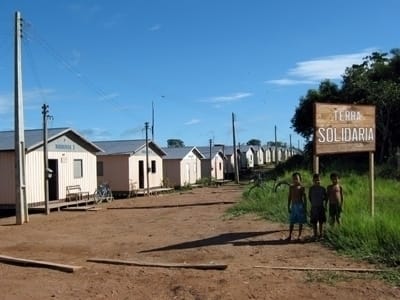Those who are able to benefit from the “Community Housing” project come for the most part from small, indigenous communities of rural riverbank dwellers, scattered between the numerous affluent villages that line the Purús River. They live by fishing and hunting and selling their daily catch. In want of all basic necessities, they see in the ciy some ray of hope.
However, what the city offers them is unemployment, marginalization, substandard housing, and living conditions even more miserable than what they had along the river. When they arrive in the city, they find themselves in squalid housing without a minimum of basic hygienic facilities. Their garbage and sewage end up in the river and on the streets, causing infectious and gastrointestinal diseases.
House and Garden
“Community Housing” is a development project that provides families with a newly constructed and spacious house together with preventive education regarding habits of hygiene. The Prelature of Lábrea purchased a plot of land and named it “Land of Solidarity.”
 Each family receives the materials necessary to construct its new home. A floor plan of 60 square meters includes a living room, two bedrooms, a kitchen, and a bathroom. In addition, each family is given a plot of land for planting a vegetable garden to provide food for the family table.
Each family receives the materials necessary to construct its new home. A floor plan of 60 square meters includes a living room, two bedrooms, a kitchen, and a bathroom. In addition, each family is given a plot of land for planting a vegetable garden to provide food for the family table.
The total cost of materials for each house is approximately 2,500 euros (some 3,400 dollars). Since the project began in 2006, houses have been built for more than 110 families. Over a thousand perople in situations of extreme poverty have been able to improve their living conditions in the new neighborhood “Land of Solidarity” created by the Augustinian Recollects in Lábrea.
Among the organizations that have cooperated in making possible the construction of these homes are the government of the province of Navarre, Spain, and the following local governments in Navarre: Cascante, Castejón, and Lodosa and the water association in Montejurra.


